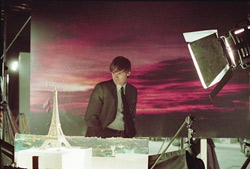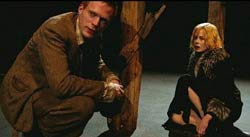Jeremy Davies and Emmy Awards Friday 21st September 2012 64th Primetime Emmy Awards Performers Nominee Reception at the Pacific Design Center
Jeremy Davies
Jeremy Davies
Spanking The Monkey Review
By Chris Cabin
Very Good
Like trip-hop group Massive Attack, David O. Russell started off quiet and slowly became loud as all get-out. With all the craziness and banter that came out over Russell's philosophical slapstick masterpiece I Heart Huckabees, it's hard to believe that his foray began with this very quiet, very shocking film. Even the settings seem to have slowly become more and more convoluted: Spanking the Monkey was filmed in a quiet, almost-Podunk town in upstate New York, I Heart Huckabees is set in the sprawling, bombastic landscape of Los Angeles. However many differences I can name, there's no denying that both films are Russell's; they both exude a peculiarity and hypnotic style that piss plenty of people off.
Raymond (Jeremy Davies) is prepping himself for a very rewarding medical internship when his father, Tom (Benjamin Hendrickson), insists that he return home to take care of his sick mother (Alberta Watson) who has broken her leg. As all college students are, Ray becomes randy and hormonal with mounting professional frustration, the constant physical contact with his mother and the inclusion of Toni (Carla Gallo), a high school student that he tries to deflower. The rest of the movie is, essentially, leading up to the big climax of Ray getting frisky with his mom in an incestuous, liquor-driven free-for-all. It's easily one of the more interesting films about oedipal relations, but there are problems.
Continue reading: Spanking The Monkey Review
Secretary Review
By Blake French
Excellent
Secret desires and dark, unusual fetishes make for great fiction, but few filmmakers have enough courage to tackle ideas that private. However, Steven Shainberg has more than enough audacity and he doesn't hesitate to push the envelope way beyond the norm with his new movie Secretary, a film which appropriately won a Special Jury Prize for originality at Sundance. 

Secretary explodes with juicy innuendo, even from its opening moments. An extending establishing shot plays against mischievously sensual music as a woman seductively strolls through a business office performing secretarial duties. She approaches a desk, staples a few papers, pours fresh coffee into a mug, and then returns to her employer. Sounds ordinary, except that she does these things while locked inside a weird S&M device.
Continue reading: Secretary Review
The Florentine Review
Weak
The Florentine has that desperate desire to be Reservoir Dogs, with a rogues' gallery of ex-cons, mobsters, and sad sacks all trying to make a go at life and intersecting at their favorite bar. Alas, few of their stories are worth paying much attention to, though James Belushi is (unintentionally) hysterical as a scam artist taking advantage of poor Luke Perry.
Cq Review
By Joshua Tyler
Good
Am I supposed to be excited that Francis Ford Coppola's son is directing his first film? Apparently everyone else is. Maybe Roman Coppola will become the genius director his father is. But if he wants to prove it, he's going to have to do a bit better than CQ.

CQ stars mostly people you've never heard of in a movie about making movies that were never actually made. Don't worry, it's really not that confusing. Boring, yes, but certainly not confusing. Jeremy Davies plays Paul, a struggling young director, who funds his personal film by working as a film editor on a cheesy, big budget science-fiction movie. But his director doesn't have an ending, and eventually Paul finds himself gifted with the job.
Continue reading: Cq Review
Teknolust Review
Bad
A sci-fi film for those who enjoy the concept and theory of the genre, if not actually its practice, Teknolust would probably be better enjoyed if it had been made into a multimedia display for a modern art museum. But, alas, it was not, and so viewers have to endure new media artist Lynn Hershman Leeson's uncomfortable attempts at taking her cracking-stiff theories and translating them into dramatic narrative form.

Dipping back into the world of the micro-indie film - which she seemed to have mostly abandoned after the passing of her cinematic mentor, Derek Jarman - Tilda Swinton plays four roles here, but Dr. Strangelove it ain't. Her primary role is as Rosetta Stone (get it?), a bio-geneticist who, in a strangely-reasoned attempt to help the world by creating robots equipped with artificial intelligence, has discovered how to download her own DNA into a computer and thus create three SRAs (Self Replicating Automatons) in her image. The SRAs are named Ruby, Marine and Olive and dresses them each according to color (red, blue, and green). This doesn't serve much purpose besides being pretty look at, and also giving us an easy way of telling the Swintons apart (aside from the fashion-victim wigs Ruby and Olive wear). Rosetta herself is easy enough to ID: as the nerdy scientist, they put her in the most frightful and unattractive of the wigs and make her goggle out at the world from behind a pair of giant glasses.
Continue reading: Teknolust Review
Spanking The Monkey Review
Very Good
Probably the best mother-son incest movie ever made, and I mean that from the heart. Incidentally, this is David O. Russell's first film, launching his career as a purveyor of the truly bizarre.
29 Palms (2002) Review
Bad
You're a filmmaker with a quirky cast but no money to actually shoot your movie. What do you do?
Well, you borrow the oldest trick in the book by putting your characters in the desert, where you can pretty much shoot your movie for free!
Continue reading: 29 Palms (2002) Review
Dogville Review
Weak
Lars von Trier's peculiar compulsion to humiliate his heroines (and by extension the actresses who play them) has finally crescendoed to a deafening din of indiscriminate, exasperating martyrdom in "Dogville," a daring experiment in heightened performance and minimalist filmmaking that is fatally undermined by the Danish writer-director's conceit as a narrator.

His last four movies ("Breaking the Waves," "The Idiots," "Dancer in the Dark" and now "Dogville") have all dealt largely with the psychological (and sometimes physical) torture of vulnerable female protagonists. While his storytelling and cinematic style are almost always compelling, he's never seemed so arbitrary in his sadism than in this allegory of a beautiful, 1930s flapper fugitive hiding from the mob in a ragged, remote, austere Colorado mountain hamlet, where the tiny populace goes from distrustful to accepting to maliciously cruel on little more than von Trier's say-so.
Played with discernible dedication by Nicole Kidman, Grace is a porcelain enigma of self-flagellation so determined to escape some kind of shadowy past that, in exchange for the skeptical township's shelter, she agrees to indentured servitude -- doing handy work, favors and manual labor one hour a day in each of the seven households. She gradually comes earn the friendship of all -- even those most reluctant to accept her.
Continue reading: Dogville Review
Jeremy Davies
Occupation
Actor
Popular
Jeremy Davies Movies

Secretary Movie Review
Secret desires and dark, unusual fetishes make for great fiction, but few filmmakers have enough...
Advertisement

Cq Movie Review
Am I supposed to be excited that Francis Ford Coppola's son is directing his first...
Advertisement

Teknolust Movie Review
A sci-fi film for those who enjoy the concept and theory of the genre, if...

Dogville Movie Review
Lars von Trier's peculiar compulsion to humiliate his heroines (and by extension the actresses who...

